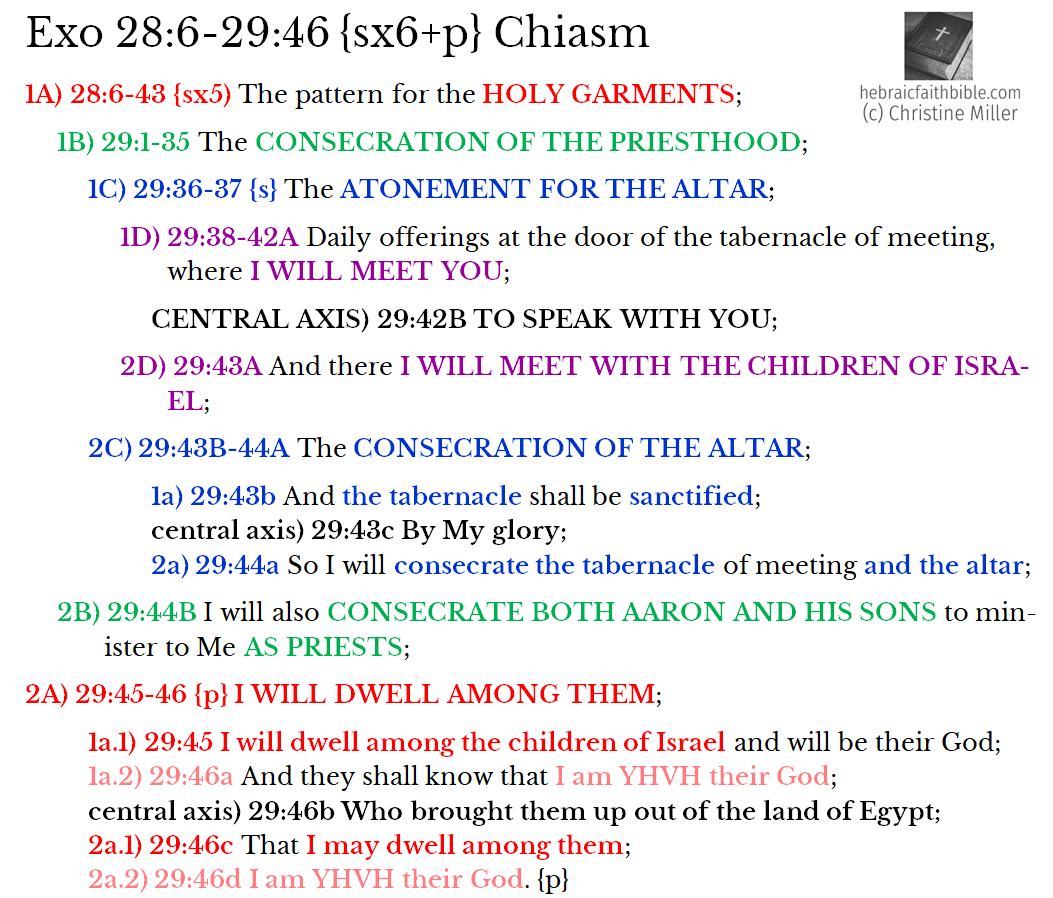Read Exodus 28:6-29:46 at Bible Gateway.
Hebrew paragraph divisions
28:6-12 {s} The pattern for the ephod
28:13-14 {s} The pattern for the chain and settings of gold
28:15-30 {s} The pattern for the breastplate
28:31-35 {s} The pattern for the robe of blue
28:36-43 {s} The pattern for the crown, turban, tunic, sash, tunics + hats for Aaron’s sons + consecrate them + linen trousers
29:1-37 {s} Instructions for the service of consecration
29:38-46 {p} Continual burnt offerings for the altar
Chiastic structure
Clearly the A pair is forced together by the surrounding elements. In meditating on the connection of the holy garments for the priesthood, with YHVH dwelling among them, I noticed a repeating phrase in Exo 28:6-43, the 1A pair. Repetition is a teaching tool of Scripture:
AARON SHALL BEAR the name of the children of Israel on the memorial stones of the ephod … Exo 28:12
AARON SHALL BEAR the names of the sons of Israel on the breastplate of judgment over his heart … Exo 28:29
AARON SHALL BEAR the judgment of the children of Israel over his heart by the Urim and Thummin on the breastplate … Exo 28:30
The holy crown on Aaron’s forehead, that AARON MAY BEAR the iniquity of the holy things which the children of Israel hallow in all their holy gifts … Exo 28:38
In every instance, shall bear is Strong’s H5375 נשא nasa, a primitive root meaning, “to take up.” As per the Ancient Hebrew Lexicon, the shin was transposed from an original sin.
nun נ ן = seed, thus continue, heir, son
sin ס = thorn, thus grab, hate, protect
aleph א = ox head, thus strength, power, leader
The story: Persistently (continually, nun) grabbing hold (sin) with strength (aleph), thus labor, to take up or lift up a burden. This word is often translated “to pardon:”
[One application of this root is in] the taking away, forgiveness, or pardon of sin, iniquity, and transgression. So characteristic is this action of taking away sin, that it is listed as one of God’s attributes (Exo 34:7; Num 14:8; Mic 7:18). Often this form of nasa is used in prayers of intercession; by the messenger of Joseph’s brothers (Gen 50:17), by Pharaoh (Exo 10:17), by Moses for Israel (Exo 32:32, Num 14:19), by Abigail for Naboth (1 Sam 25:28), and by Saul to Samuel (1 Sam 15:25). It is used by Joshua in his farewell address (Jos 24:19). No doubt the classical expression of this meaning is to be found in Psa 32:1, 5. – Theological Wordbook of the Old Testament
Of David. Maschil. Happy is he whose transgression is forgiven [nasa], whose sin is pardoned. Psa 32:1
I acknowledged my sin to You, and my iniquity I have I not hid;
I said: “I will make confession concerning my transgressions unto YHVH”–
and You, You forgave [nasa] the iniquity of my sin. Selah. Psa 32:5
Sin can be forgiven and forgotten, because it is taken up and carried away.
The IA pair is highlighting that it is the function of the High Priest, clothed with holy garments for splendor and beauty, who takes up the burden of the peoples’ sins, and carries them away. And this action of atonement allows God to dwell with us, to meet with us, and to speak with us. It is the gospel of grace, and a picture of the restoration of our relationship with Him that was severed in the Garden, through the agency of Yeshua our High Priest.


















Leave a Reply